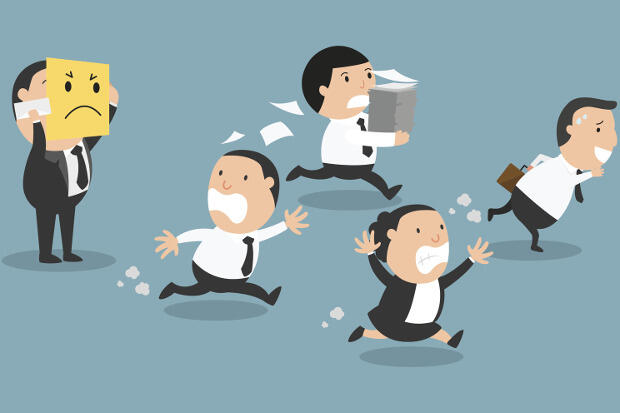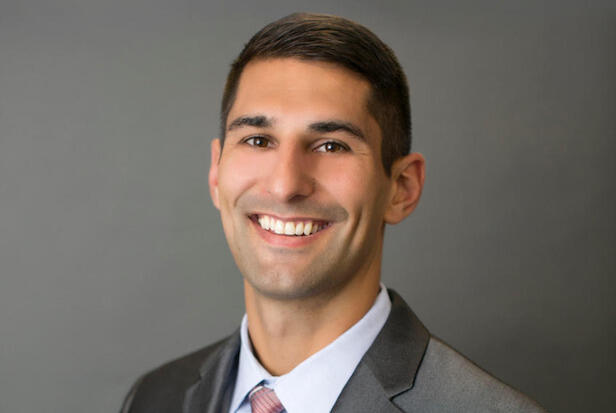Oct. 9, 2017
Narcissism, mindfulness and leadership: Q&A with Christopher Reina
Share this story

Narcissism is a personality trait that can plague leaders and CEOs and breed a culture of yes-people and fear of challenging authority in the workplace, says Christopher Reina, Ph.D., an assistant professor in the Department of Management at the Virginia Commonwealth University School of Business.
“A narcissistic leader is only able to assess how a situation impacts him or herself and takes actions to reinforce a sense of self-importance and to demonstrate that he or she has high self-worth,” Reina said. “To others in the organization, this is very disempowering and demotivating.”
Reina researches leadership approaches. In addition to narcissism, he specializes in areas such as leadership ethics, emotions, neuroscience and mindfulness. These topics help him understand and explain why an employer loses or retains employees, how and why employees perform the way they do and what makes an effective long-term leader.
He shared his advice, research and opinions on everything work-related in a recent interview with VCU News.
What does CEO narcissism look, sound, feel like? In what ways does it affect the entire work culture/environment?
A narcissistic CEO sees the world through his or her own eyes all the time. He or she is not able to understand that others have feelings and opinions and thoughts and that they matter. Employees learn that reinforcing the CEO’s sense of self-importance is the only way to get ahead but this creates a culture such that the best opinions, thinking, and ideas are never discussed. This destroys creativity, ensures everyone in the organization constantly fears upsetting the CEO, and weakens morale as individuals know they are only one mistake away from being fired. Everyone exists in fight-or-flight mode, suppressing the highest levels of rational and higher-level thinking.

Are there different degrees or categories of narcissism?
There are two types of narcissism. When individuals exhibit vulnerable narcissism, they are highly neurotic and tend to view others’ actions as malicious such that they react with distrust and aggression. Grandiose narcissists on the other hand, desire to be the center of attention and exhibit high levels of arrogance, self-absorption, and entitlement, and are constantly seeking ways to reinforce their sense of dominance and status. … [Narcissists] seek to reinforce their self-image and self-worth in their own and others’ eyes, which results in a set of behaviors that most of us view as distasteful, insulting, callous and short-sighted.
Do you feel as if some people misinterpret narcissism as incredible confidence or the sheer will to make “gutsy” decisions? In a scientific sense, how do narcissists win [people] over?
[Narcissists] appeal to humans’ basic instincts of self-protection. When they convince us that there is an enemy, they engage our basic fight or flight instincts that create in us a sense of self-protection and inhibits our higher level, rational thinking. Thus, we react from a place of anger, fear, and anxiety rather than respond in a more thought-out and considered response.
How did your interest in mindfulness and leadership come about?
I have always been interested in why employees leave their managers and in my experience, it has to do with leaders and followers not being able to truly be authentic with each other at work. There are egos that get in the way and individuals jockey for position and try to continually one-up each other. To me, mindfulness is an antidote to ego-based and self-reinforcing behaviors at work, so it can be very helpful in creating workplaces that are full of positive emotions and genuine caring for each other. When environments like this exist, employees stay because they feel good and they are empowered to make a difference.
Explain mindfulness, specifically in the work environment.
Being mindful means being present in the current moment without judgment. This occurs when one is able to align body and mind since the body can only exist in the present moment. At work, being mindful means not allowing the mind to run away with thoughts about the future (such as how many tasks you need to accomplish by the end of the day) or the past (such as thinking about how the conversation you had with an employee did not go well). In both these cases, the thought patterns take the individual away from the present moment, and create stress and anxiety such that they are not able to be at their best throughout the workday.

Would you say that some CEOs are inefficient in a sense because they do not practice good mindfulness and leadership?
Absolutely. Individuals at work can be held back by their inability to manage stress and anxiety, and their personal and work relationships can be suboptimal because they react from a place of mindlessness, such that their words and actions are reactions rather than considered responses.
How exactly do you use neuroscience to study an employee in their work environment?
Theoretically, leaders could go about their workday with an EEG cap on their head, which would capture their neurological data, but feasibility, ease, and cost make this difficult. It is much more common to have leaders come into the lab for 30-60 minutes to get fit for a neuro EEG cap and then to take part in a series of exercises or tasks in which researchers capture participants’ neurological data. This has the disadvantage that the leaders are not going about their daily tasks at work, but allows much more control for the researchers. This method has been used previously to demonstrate that leaders who are rated as more visionary by their employees (i.e., are able to paint a compelling vision for the future of the organization), actually have more neural activity in the area of the brain associated with vision (occipital lobe). This demonstrates that leaders who are more visionary, at a neurological level, are actually “seeing” the very future of the organization they seek to bring about.
Your “Adverse Effects” paper went into detail on how mixing family and work can halt the success of a CEO’s firm. How does family affect work?
The main point of this paper was that CEOs are not immune to the negative effects of things that may happen at home. In other words, CEOs, just like all employees, experience stressors and strains at home that then deplete their ability to do their best job at work. For organizations, when this happens to their CEOs, it is especially problematic, due to the sheer amount of decisions that CEOs make on a given day that have a big impact on an organization’s performance.
What was the single most interesting piece of information you discovered in doing your research that shocked, surprised or delighted you?
I think the single most intriguing and interesting, yet incredibly simple finding I have come across is that people just want to be respected and valued. We often make it seem that humans are complex — and we are in many ways — but in the end, being treated with respect and as if we actually matter goes so far in getting us excited about our work and giving our best effort.

What got you into management and business?
The people side of business has always fascinated me — figuring out why some individuals are effective leaders while others are not is very challenging. I have worked for and witnessed many not-so-great leaders and it was incredibly de-motivating for the people who worked for such leaders. Many ultimately left the company. In the end, I felt that I could make the most impact by teaching and training individuals how to be more effective leaders so they don’t end up losing their employees due to destructive behaviors they may not even know they are exhibiting.
Have you had a telling moment that made you realize “that’s what good leadership is all about” or “that’s what bad leadership is all about?”
Good leaders accomplish tasks through building strong relationships.
Leadership comes down a lot to how a leader makes other people feel. Do they feel their leader talks down to them or do they feel empowered? Do they feel their leader genuinely cares about them or do they feel their leader only needs them to get a task completed? I see many instances of when leaders make the mistake of managing tasks rather than leading people, and that to me is the difference between good leadership and bad leadership. Good leaders accomplish tasks through building strong relationships.
You have worked with Chipotle and Aetna. What did you learn and what are the challenges of helping such big corporations?
I learned that most individuals want to do their best at work and to continually develop. However, deadlines, stress, and leaders’ inability to see how their actions and words can damage the motivation of their employees often get in the way of their effectiveness. The challenge of being a great leader in any company is that you must be in control of yourself at all times. This means understanding your triggers and your stressors and being able to step back when you feel stressed so that you can be more intentional with your words and behaviors.
What would you like to add about your research findings or the business world?
Life is short and the only thing we have to count on is the moment we are currently experiencing. Making the most of our time by being present can unlock many experiences and relationships that we would otherwise be too busy to notice. Paying attention is one of the most precious gifts we can give others. Being aware of how and what we are paying attention to in a given moment is one of the most precious gifts we can give ourselves. Together, these ideas have so many important implications for leadership.
Subscribe for free to the VCU News email newsletter at http://newsletter.news.vcu.edu/ and receive a selection of stories, videos, photos, news clips and event listings in your inbox every Monday and Thursday during the academic year.
Subscribe to VCU News
Subscribe to VCU News at newsletter.vcu.edu and receive a selection of stories, videos, photos, news clips and event listings in your inbox.








